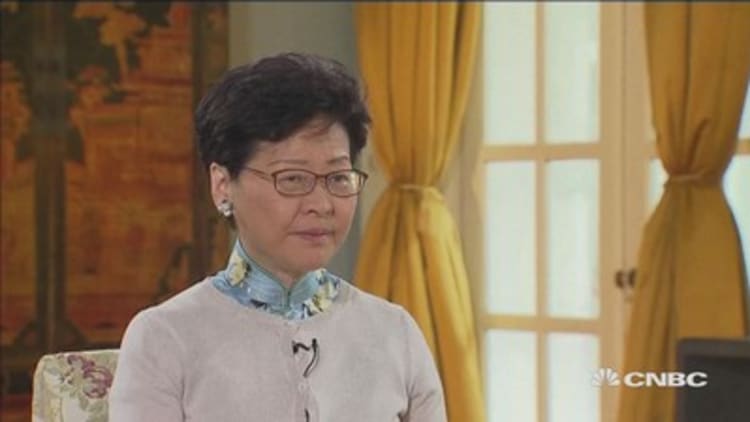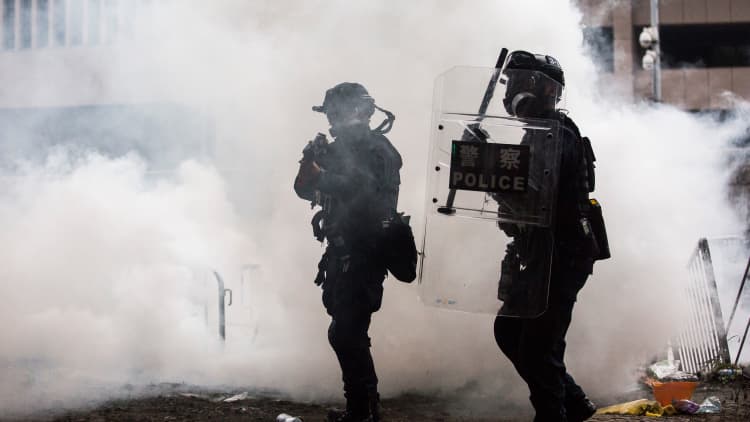
Protests against a controversial extradition bill in Hong Kong continued Thursday, but without the scenes of chaos that rocked the global trade and finance center a day earlier.
Hundreds of protesters gathered in a park near the Legislative Council — Hong Kong's legislature — amid on-and-off heavy downpours through the day. Overall numbers appeared far less than on Wednesday, which saw approximately 10,000 demonstrators in the streets, according to police estimates.
Riot police were deployed again on Thursday but their presence was lighter.
The demonstrations started over the weekend, but escalated on Wednesday when police and demonstrators clashed for hours. Citizens were protesting Chief Executive Carrie Lam's proposed legal amendments that would allow suspected criminals in Hong Kong to be extradited to mainland China.
Demonstrators had gathered around the Legco — as the legislature is informally known — ahead of a scheduled debate by lawmakers over the controversial extradition plan. The debate was ultimately postponed due to the disruption caused by protesters.
So I consider my officers are acting in accordance with our guidelines and they rightfully used ... force to protect themselves and other people at the scene.Stephen LoHong Kong's police commissioner
There was speculation the lawmakers would try to meet Thursday but it was announced in a statement that they would not.
Government offices in the financial district were closed for the rest of the week due to the protests. Public transportation was disrupted in the morning, though the subway station servicing the area around the legislature reopened later in the day.
On Wednesday, police wielding batons and riot shields fired tear gas and rubber bullets at crowds, while protesters used open umbrellas in defense, with some throwing objects at police.
The government said a total of 79 people were injured and hospitalized as of 11 a.m. local time Thursday, with two described as in serious condition.
Lam, who is Hong Kong's top official, has refused to withdraw or delay the extradition plan. She held her ground and condemned the protests as "intolerable" in a Wednesday evening video address.
"Clearly, this is no longer a peaceful assembly but a blatant, organized riot, and in no way an act of loving Hong Kong," she said.
One country, two systems
The Hong Kong Bar Association, which condemned "violence perpetrated by any party," had particularly harsh words for how the Hong Kong police acted against demonstrators, and for the government's stance on the extradition proposal.
"These acts include the deployment of wholly unnecessary force against largely unarmed protesters who did not appear to pose any immediate threat to the police or the public at large," the association said in a statement Thursday, citing videos.
"Given the clear and plain opposition recently voiced by such a significant portion of the public, any responsible administration which sees itself to be accountable to the public should see the necessity to pause, engage in dialogue with the community and reconsider its stance," it said.
Hong Kong's police commissioner, Stephen Lo, defended the force's actions.
He said at a press conference Thursday that officers faced a "hostile and very unstable" crowd in excess of 10,000 people the previous day, and tried to avoid confrontation.
"So I consider my officers are acting in accordance with our guidelines and they rightfully used ... force to protect themselves and other people at the scene," Lo said, adding that the police would carry out an "after action review" of its activities. He said that all 19 complaints that have been made against the force, which include assault, would be investigated and submitted for external review.
Asked if Hong Kong would seek help from the People's Liberation Army, the Chinese military, Lo said: "At the moment, we will definitely not (be) seeking (the) PLA's assistance because we have sufficient manpower, sufficient force to contain the situation and maintain Hong Kong as lawful and peaceful society."
The protests, which kicked off Sunday with a massive rally, underscore worries about what is seen as a broader erosion of Hong Kong's rights and freedoms in relation to China.
Hong Kong citizens, who enjoy a British-based legal system independent from the rest of China, fear the plan could threaten those judicial protections and their broader autonomy.
"The general perception is that the law is ... designed to create some kind of deterrence effect against the pro-democracy movement and the dissidents in Hong Kong," Joseph Cheng, a pro-democracy advocate and retired professor of political science, said Thursday on CNBC's "Squawk Box."
The Chinese territory of 7.4 million people, formerly part of the British Empire, has been a specially administered region of China since July 1, 1997.
It has its own government, currency, police force and civil service. Under a unique "one country, two systems" framework, China handles foreign affairs and defense and the PLA maintains a small garrison but keeps a low profile.
Lam, who says the legal changes are necessary, categorically denied Monday in remarks to reporters the idea that they were proposed by the central government in Beijing. Still, China is on record as backing the bill, though it dismissed concern it was trying to water down Hong Kong's autonomy.
"Hong Kong people's rights and freedoms have been fully guaranteed," Geng Shuang, a Chinese foreign ministry spokesman, said at a regular briefing Wednesday in Beijing.
'Tyranny opens fire'
The violence appeared to shock Hong Kong.
Local newspapers carried photos of the clashes on their front pages Thursday. "Tyranny opens fire on us," the liberal Apple Daily wrote in Chinese on its front page over a photo of riot police squaring off with demonstrators.
"I'm hurt. It's sad," a local government worker, who requested anonymity, told CNBC of his feelings about the violence. "It's dangerous." he added.
Police said that 240,000 people participated at the peak of Sunday's protest that saw throngs march down a main street shouting slogans and carrying signs denouncing the legislation and demanding Lam resign.
Organizers, however, claimed a turnout of slightly more than 1 million. The last time Hong Kong saw a protest of such scale was in 2003 when an estimated 500,000 people rallied against a proposed security law that also raised fears of closer links to China.
Business groups and foreign governments have expressed concern that the extradition plan could make Hong Kong a less attractive place to do business if its legal system is compromised.
But even some that basically support the government's plan are concerned about the conflict it has generated.
The Hong Kong General Chamber of Commerce, for one, said the protests show the existence of "serious apprehensions" in the city.
"We call for restraint from all parties to ensure that this issue will not undermine business confidence in Hong Kong and our international reputation," Shirley Yuen, its CEO, said in a statement.
Hong Kong's Hang Seng index took a hit for a second day, finishing marginally lower on Thursday after paring bigger losses earlier in the session.
Watch: Violent protests broke out in Hong Kong — Here's what happened

— CNBC's Vivian Kam, Paula Sailes, Yolande Chee and Grace Shao contributed to this report.
Correction: This article has been corrected to reflect that protests continued on Thursday.


